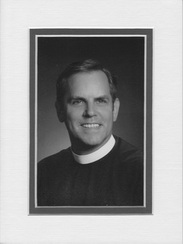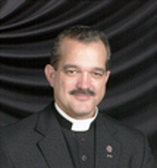 Tuesday, December 17, 2013
Day 345 – Zephaniah 1, Psalm 130, Mark 8
In the next three days we will read the short book of Zephaniah. If you’re like me, you will want to read it all today so you aren’t depressed the rest of the day. All we hear today in Chapter One is gloom and doom: “I will sweep away everything from the face of the earth…I will cut off humanity from the face of the earth… that day will be a day of wrath, a day of distress and anguish, a day of ruin and devastation, a day of darkness and gloom, a day of clouds and thick darkness…”
We only hear from this book of Zephaniah once in our three year cycle of Sundays, and it did come up for us last year in Advent - Year C. However, even then, we do not hear the doom and gloom. Rather, we hear Chapter 3, which contains the resolution to the destruction proposed in the earlier verses: “I will make you renowned and praised among all the peoples of the earth, when I restore your fortunes before your eyes…(3:20b).” Now that’s a kindlier and gentler Christmas Card, isn’t it?
We can lose a lot when we do not look at these messages in their total context. Just as the doom and gloom can lead to despair if not considered only as a prelude to the possibility of God’s redemption, so too the glory of redemption can lead to complacency if not considered in the context of what life will be without God. Zephaniah’s age was one in which the people could relate to both sides of the equation. There was the doom and gloom that Hezekiah had recently lost 45 cities to Sennacherib, and more recently, with further kings losing power to Assyrian influence, the religious life of the people had correspondingly suffered. However, there was now emerging the hope of redemption, since Assyria is now declining, and restoration and reform seem to be a possibility.
So maybe today is a good day to look at the context of our own life story. Is not that the opportunity that the season of Advent provides us? To understand that the doom and glooms in my own life can only be fully understood and appreciated in the light of God’s redemption of me, and conversely the full appreciation of God’s redemption of me can only take place within the context of my fuller understanding of how gloomy life is without God in it.
To get to that full understanding requires a lot of Advent patience. And a lot of that patience has to do with understanding who Jesus is and what his plan for the Kingdom is, which is exactly what Peter struggles with in Mark 8 today. It is not unlike the situation with John the Baptist questioning Jesus from his jail cell that we heard just this past Sunday.
Need reassurance that patience will pay off? Let Zephaniah 1 soak in a bit, but before you get depressed skip to Zephaniah 3. Let the reality of the cross soak in a bit as you read Mark 8, but before you despair and stop walking with Jesus, skip to Mark 16. By keeping the life of the Gospel and our living into it in context, our resulting attitude can be like that of the author of today’s Psalm 130: “I wait for the Lord, my soul waits, and in his word I hope; my soul waits for the Lord more than those who watch for the morning, more than those who watch for the morning. O Israel, hope in the Lord! For with the Lord there is steadfast love, and with him is great power to redeem (Psalm 130:5-7)”.
- Marty Zlatic
 Evangelism – that art form that allows us to share the love of God with another in such a way that they also love God. It is not an easy trick and it so often fails. As we look at the reading from Mark, I think some of the reasons are clearly visible.
Jesus has been doing remarkable things and God’s power has been on display. However to the traditional leaders of the faithful, he isn’t doing it right. There are rules you know, and you – Jesus and company – are not following them! The desire to follow God has become deformed into following rules. Some of those laws, such as pledging the money that should be used to support aging parents to the altar, are self-serving. No matter, they are now part of the tradition and often we are better at teaching tradition than sharing true and powerful experiences of God.
Jesus’s statement against this understanding of defilement, breaking God’s law, is telling. The problem is not what happens to the outside of you, but what is coming out of the inside of you. Your words and actions are what is important to God, not what you eat or how you eat it.
Habakkuk shares today a poem, perhaps a prayer, describing the awesome experience of nature, of a storm, and attaching it to the victories achieved in battle. History and nature intertwine here to explain the experiences of the people in light of the activity of God. God controls the cosmos and God controls history.
Habakkuk assures his readers that rejoicing in the Lord is not in response to victory alone. That even if there were no food, fruit on the vine, failed olive crops, and flocks lost, that even then, God is the source of salvation and strength.
We need to know that. We need to know that faith is not about following laws, or always winning because “God is with us.” Instead God is our hope in times good and bad. Our faith is not proved by our success but by our reliance on God in all things. That in God is there is a healing that we might not expect, or perhaps in the case of the Syropheonician woman, even seem to deserve.
Today, may you find God in the world around you. May you find the healing that even you may not believe that you deserve. May you find salvation.
 Habakkuk 1 At this point in our exploration of Holy Scripture, a lot must seem to be awfully repetitive. The classic age of prophecy encompassed a couple of centuries that were punctuated by two traumatic events for the ancient Jews: the collapse of the northern Kingdom of Israel in 721 BC and the fall of the southern Kingdom of Judah (from which the word “Jew” is derived) in 586 BC. The prophets of these stressful times had a consistent message: that the people shouldn’t have a false sense of security (that was based on a false sense of religion), and that doom was coming.
We know next to nothing about the prophet Habakkuk. Some biblical scholars believe that the three chapters of this short book were written in different periods and were not originally a unit. Others hold that the man Habakkuk preached and wrote during the reign of King Jehoiakim (609-598 BC), just prior to the first deportation of the Babylonian Exile.
The first chapter of the book (and the first five verses of chapter 2) is written as a dialogue between the prophet and God. Habakkuk is tormented by the fact that violence prevails and God seems to tolerate great evil. The response the prophet receives from God is dismaying: that the Chaldeans (Babylonians) are God’s instrument sent to punish the wicked, including the wicked of Judah. Yet how could a just God use such violent men to punish people who are less evil? And how could God allow so many innocent and righteous people suffer just for the sake of punishing the wicked? The Chaldeans are so bad that they even worship their own military might! (Hmmm!)
Mark 5 Since we have already read through the Gospel of Mark last winter, and someone else has already written a commentary on it, my remarks here will be very brief. Chapter 5 shows Jesus on a preaching tour, but it turns out that this particular tour was characterized more by healing than preaching. (Although the healings, of course, were an enacted form of preaching: Jesus’ mighty deeds gave credence to his words.)
Jesus cures the Gerasene demoniac. The people of the surrounding area were amazed, but apparently not grateful, since they begged Jesus to leave the region. Perhaps they were more concerned about the economic loss from the herd of pigs than they were about the healing of a man imprisoned by severe mental illness. There must have been many Gentiles in the region, for Jews would not raise pigs nor eat of their flesh.
Next Jesus raises the dead daughter of one Jairus, who had a leadership position in the local synagogue. But the telling of this particular episode is interrupted by another: Jesus’ healing of the woman who had suffered endlessly from a flow of blood. Then the narrative reverts to the story of Jairus’ daughter. Oddly, once Jesus restores the girl to her parents “he strictly charged them that no one should know this…” Jesus gives this admonition several times in Mark’s Gospel. One wonders: Isn’t the point to proclaim Jesus? Why be hush-hush about marvelous healings? Biblical scholars call this puzzle in Mark the “Messianic secret”. Perhaps the reason for this is that Jesus was afraid that people would misinterpret his role. The traditional expectation of the Messiah was that he would be a strong political/military hero who would overthrow the foreign oppression (Rome in Jesus’ day). But Jesus understood that his role was very different. It wasn’t the razzle dazzle of the miracle cures that was most important in his ministry. Rather, it was his extreme love in going to the Cross that was the pinnacle of his mission. Only after the Resurrection could people begin to piece it all together and begin to make sense of it all.
 Devotional Micah 5
This past week we had some exciting times taking place in the new Diocese of Toliara. We had our first ordination to the priesthood, our first strategic planning sessions and development of a mission and vision, followed by four days of first diocesan Synod (Convention) and then the events were climaxed by the installation of our first Archdeacon. It was an exhilarating eight days. All of this started earlier in the year through the election of our first diocesan bishop and creation of the new diocese of Toliara. Back in May, we began preparing for these awesome events. The anticipation and excitement was overwhelming. When time got closer, I sensed a mixture of trepidation and excitement in the air. Maybe because I was a bit slower in seeing how this was going to all play out. Maybe because all of this was unknown for the Diocese and we were treading on new ground. Or maybe it was because our past was brief and our future was wide open. But after the first couple of days, by the grace of God, everything seemed to just move into place.
This reminds of us of the passage from Micah Chapter 5, where the Scriptures inform us about the promised Ruler from Bethlehem (v2). Bethlehem was the smallest of the clans and possibly the least of them. I’m sure there was lots of trepidation and excitement for all to rise to the occasion. Those in power like King Herod would feel threatened while those not in power, like the majority of Jews, wanted to be empowered. Advent is like this, it’s the time of preparation as we look to the past, to the first coming of the Messiah and with anticipation and trepidation towards the future, the second coming of the Messiah, the King of Kings.
May your anticipation and trepidation during advent lead you into a sense of Majesty at the throne of the King of Kings.
+Todd
 The tune of We Three Kings streams regularly through my house these days. My eight-year-old son, Jack, is learning it for piano class.
Kings is not your typical Christmas carol. It is played in a minor key. In Listening to Music, author Craig Wright explains that in the Near East, minor key tonality is often used in optimistic tunes. To western ears, however, minor keys sound somber and foreboding.
Reading Matthew 26 in the second week of Advent, We Three Kings reverberates in my mind. I cringe as the plot against Jesus comes to fruition. It is painful to see him praying in agony and devastating when he is betrayed and denied by his own. Micah’s prophetic words, “They do not know the thoughts of the Lord; they do not understand his plan,” ring true.
This is not typical Advent material – and yet there is a great beauty in it. All the betrayal, the suffering, the pain and loss accomplished what was begun in Jesus’ birth. Christ’s movement toward Calvary is God’s love in motion. The pain and the joy are all part of the whole.
We Three Kings ends this way:
Glorious now behold him arise;
King and God and sacrifice:
Alleluia, Alleluia, sounds through the earth and skies.
Alleluia and Amen.
--Susan Beebe
 Daily Blog – Day 332, Micah 3, Psalm 119:145-176; Matthew 25
Gift giving says a great deal about the giver. But it can also say something quite significant about the receiver!
As we now find ourselves in the early and often frantic stages of Christmas preparation with gift purchasing, wrapping and delivery, we realize that some folks do make an effort to find that “perfect” gift. Such gifts may help to make life more comfortable, enjoyable, or meaningful. Have you ever thought that that is exactly what God had been doing throughout the ages? The witnesses of the prophets, including Micah, reveal a history where God had provided much for God’s people. But the people instead of graciously receiving and seeing God’s grace as improvement and blessing, ignored the giver and strove to create their own life’s meaning and purpose. What more could we need or want than to be loved, protected, fed and clothed, and free of fear? All of God’s gifts provide as such and much more when we receive and utilize them, and in turn give to others as we have received.
Matthew 25 sharply reminds us of the importance of making use of the gifts God bestows upon us. As a result of living by the New Testament’s “Great Commandment” to love God with all our heart, mind and soul, and to love our neighbor as ourselves, we see our human connectedness as an opportunity to give and receive, to share and find fulfillment. The gifts we are graced to receive are not for selfish gain but are purposed to transform us and enable us to give and share of God’s endless bounty and richness. That is what much of the Old Testament people missed out on as a result of their hardened and selfish hearts. Unfortunately, such attitudes and behaviors have continued throughout time and are still prevalent today. How are we giving recognition to God as the source of our gifts and offering our thanks? How are our lives demonstrating gratitude to God and joy for the love we have?
I am reminded of the popular 1906 short story classic, The Gift of the Magi by O. Henry, who speaks of a young married couple and how they deal with the challenge of buying a Christmas gift secretly for each other with very little money. Here is the wisdom of the magi who visited the Christ child. They reveal a love that is willing to sacrifice, to be patient, to endure, and to continue to support and guide one another. It is all about selfless giving. But it is equally important as how it is gracefully received and allowed to transform us.
May the gift of Christ’s birth in our lives for which we continue to prepare our hearts, lives, and homes during this Advent Season bless us in our waiting and in our own giving and receiving!
Blessed Advent,
Father William+
__________________________________
The Very Rev. Dr. William L. Stomski,
Chaplain and Sacred Studies Educator, Saint Joseph’s Episcopal School, Boynton Beach
Dean of the Diocesan School for Christian Studies
 The Bible Challenge
Diocese of Southeast Florida
Micah 2; Psalm 119:113-144; Matthew 24
A portion of our readings for day 331 reminds me of a painting that was popular a number of years ago. Perhaps you recall it. It depicted persons in a contemporary city dwelling. Some were floating up, as if being pulled heavenward, while others remained in place. Most amusing to me were the two folks in a convertible car driving down the street. I’m glad the one seemingly taken to Heaven was the passenger and not the driver! Of course the artist drew this imagery from Matthew 24:40 and following. Micah’s reading also reminds us of the Parousia (end time), or at least a cleansing of the sinfully evil.
As we now begin the liturgical season of Advent, we will read from the lectionary, or hear read and preached to us, principles concerning the end time. Purposefully the Church uses this four week period to focus our attention on the second coming of Christ, as well as, our celebration of the Incarnation of God’s Logos or Word, or Christmas.
Some denominations use these readings from Micah and Matthew to infuse fear in the hearts of their adherents. Their intention is to control their parishioners’ understanding of faith, and thus save their souls from Hell. Others have led people to mountain tops or other remote areas to await this final event of judgment. Oops…
What are your thoughts and feelings about the end times? Do you believe that Jesus will return again ushering in the “Close of the age”? Does this anticipation delight or scare you?
In our worship during Advent, we continue to reflect upon Christ’s second coming in Scripture. We weekly profess it in our Creeds, and we hear it said in our Eucharistic services. My hope is that you believe but not in fear. Today’s Psalm reflects the heart of the Psalmist who desires to fulfill the commandments not for fear of retribution but for Love. He fervently seeks in the law Sophia/Wisdom. Living by the requirements of God’s law the Psalmist pursues an intimate and passionate union with the Divine.
With the same yearning of the Psalmist I anticipate Christ’s second coming. While I wait actively for that intimate consummation, I strive to receive Jesus each day. He comes to me through His bride, the Church. He feeds to me Himself in the Sacraments of Bread and Wine, the hearing of the Word, and the fellowship of the Body. He comes to me in the innocent eyes of children, in the longing hearts of the poor and the lonely, through the aged and those who are infirm, and in the candidness of my family. He comes to me in these and so many other ways. But, I am not always watchful.
How is Jesus coming to you?
Jesus, our Christ, continually comes… We just have to have the eyes to see, the ears to hear… and the willing hearts to receive Him. Come, Lord Jesus, come!
A Blessed Advent to you all,
Fr. Bernie+
St. Martin, Pompano Beach
 Micah 1, Psalm 119:73-112, Matthew 23
The Rule of St. Benedict (Rule 48:1) consists of a three-legged stool; work, study and prayer. Study for the Christian, consists of feeding on the constant nutirition of God’s World, the Holy Scriptures. Lectio Divinia has been a traditional way of reading scripture for monks for thousands of years. It is meant to be a careful reading of Scripture, nourishing our life of faith without demanding scholarly or intellectual curiosity. Lectio Divinia is primarily drawing upon the hearts desire to thirst and drink from the living water provided by the Word of God. Today's readings remind us of the importance of constant spiritual nutrition, reading and meditating on God's Holy Word. "Let your compassion come to me that I may live, for your law is my delight." (Psalm 119:77)
Some time ago I was brought a small woven basket of lettuce, arugula (rocket), rosemary, basil, thyme and chilies, harvested from a church parishioners personal garden. The organic produce hand-picked from their homegrown patch outside their backdoor was mouthwatering and healthy; full of vitamins, nutrients and fiber. It also served as a reminder; frozen fruits and vegetables, might still be healthy, but nothing can take the place of those handpicked harvests, straight off the vine.
The same is with God’s Word; handpicked Scriptures, new every morning, keep our faith healthy and alive. Hearing a good sermon can be uplifting, listening to Christian radio and fellowship with believers has its benefits; but nothing can replace fresh, organic, God-given Scriptures. "Oh, how I love your law! I meditate on it all day long." (Psalm 119:97) As today is the first Monday in Advent, we are given a new season in which to intentionally practice our personal spiritual disciplines.
We are God’s living word in society today and are to live our lives above reproach, constantly gaining nourishment from God's Word, setting us free from the entanglement of the world and allowing us to be role models for modern day society. Jesus' warning to the crowd and to the disciples to put into practice (Matthew 23:3) their belief is a warning to us as well. Let us take seriously our responsibility to intentionally put into practice the traditions of our Christianity, meditating on the Word and living in close relationship with the Great I Am.
|








 RSS Feed
RSS Feed